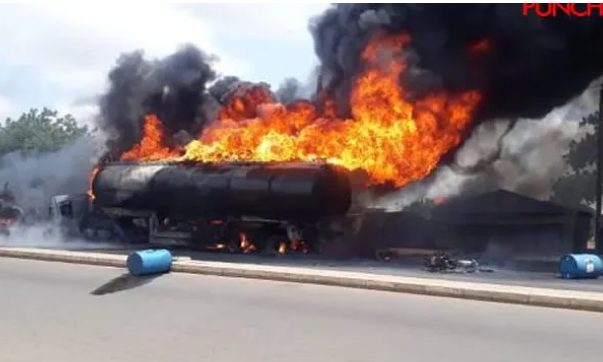News
EXPLOSIONS! FG plans to ban fuel tankers on roads over death tolls

By Kayode Sanni-Arewa
The Federal Government, FG, through the Nigerian Midstream and Downstream Petroleum Regulatory Authority, NMDPRA, has said that it might impose a ban on trucks with 60,000-litre capacity, preventing them from operating on federal highways.
This follows the increasing number of deaths resulting from petrol tanker accidents, which has led to the death of 493 persons in three years.
The government, in a proposal to stakeholders, wants tankers restricted to a maximum of 45,000 litres.
It said this ban is part of a potential recommendation aimed at reducing fatalities from petroleum tanker accidents to zero.
Chief Executive Officer, NMDPRA, Farouk Ahmed, disclosed this at a stakeholders’ engagement on the recurrence of road tanker accidents held at its headquarters in Abuja.
The meeting sought to provide lasting solutions to the frequent accidents involving petroleum tankers, which have resulted in loss of lives and property.
In his address, Ahmed said the public was seeking intervention to protect lives and properties as the government recorded 493 deaths from petroleum truck-related accidents from 2022 to date.
According to him, the carnage from the petroleum truck explosion has been on the increase from seven recorded in 2022 to 24 deaths in 2023, while 341 died in 2024; the carnage rate has already hit 121 in 2025, which is only two months from its beginning.
Ahmed, who described the rising number of accidents and fatalities as unacceptable, said urgent steps were needed to ensure safety in the transportation of petroleum products across the country.
He said, “We are here today to discuss the recent trend in road tanker accidents and the resultant fatalities and other consequences. The public is watching helplessly and looking forward to intervention to protect lives and properties.
“In the year 2022, four road tanker accidents were recorded that led to 7 fatalities and 3 injuries. The number of incidents decreased in the year 2023 to two, resulting in 24 fatalities and five injuries. By the year 2024, the number of accidents increased to 11 incidents leading to 341 fatalities and 124 injuries.
“This year to date, we have already recorded five road tanker accidents leading to 121 fatalities and 79 injuries. These incidents are unnecessary and unacceptable. They must be prevented and brought down to zero.”
Ahmed said the incidents were unnecessary and unacceptable since the authority had already put preventive measures in place
He said the measures include, “determination of an appropriate truck carrying capacity of (60,000 litres versus 45,000 litres) given the negative impact on the roads.”
He also noted that some of the measures put in place to prevent such accidents include Minimum Industry Safety Training for Downstream Operators, which includes training and retraining of drivers, motor boys, and all personnel involved in downstream operations.
He said there has been the mandatory installation of anti-spill safety valves on all petroleum product tanker trucks.
Ahmed also said there should be the implementation of safe-to-load initiatives, “Colour coding and branding of all tank trucks. Spot checks by FRSC on fatigued drivers and those under the influence. Broadcast post-crash emergency numbers and first responders to cordon off accident sites. Enlightenment and sensitization of the public about the dangers of scooping the volatile hydrocarbons at accident sites. Regular meetings with stakeholders. Regulating route management by designating routes and commuting times.”
The NMDPRA boss recalled that the requirements were arrived at by the industry collectively, pursuant to learnings from previous accidents and safety studies conducted to ensure that the business of energy provision and distribution is conducted safely and securely.
He stressed that it is, therefore, unacceptable for any operator to conduct business in contravention of established protocols and safety requirements.
He said it was the contraventions, coupled with the poor conditions of the transportation infrastructure that are leading to unnecessary accidents and unfortunate loss of lives and properties.
“It is therefore unacceptable for any operator to conduct business in contravention of established protocols and safety requirements. It is these contraventions, coupled with the poor conditions of our transportation infrastructure that are leading to unnecessary accidents and unfortunate loss of lives and properties.
“The fact that these accidents keep recurring is indicative of non-compliance by the industry with the established safety measures or that the measures are defective. Consequently, we demand that all parties should ensure strict compliance with the established safety requirements.
“In our deliberations today, we should examine the defects that are observed in these safety provisions and agree on necessary actions to close those gaps.
According to him, the fact that these accidents keep recurring is indicative of noncompliance by the industry with the established safety measures or that the measures are defective.
However, opposing the potential ban on 60,000-litre capacity tankers, the President of the National Association of Road Transport Owners, Yusuf Othman, said such a move would lead to a potential loss of over N300bn investment.
Othman explained that there are currently about 2,000 trucks with 60,000 litres capacity involved in the transportation of petroleum products with each costing over N150m.
He stated, “We are saddened by these occurrences and we believe measures need to be taken to avoid future occurrences. But, in doing that, we need to avoid being sentimental in making certain decisions so that we don’t throw the baby out with the bathwater.
I want to remind everybody here that transporters are investors and these investments are huge. Any truck that loads 60,000 litres must be a truck with a strong and sound engine at an average cost of N150m. By our estimation, we have 2,000 of them. We are talking about N300bn investments, some of which were financed by banks and other lenders.”
“We believe that necessary measures should be in place that are going to stop the occurrences. But in doing that, we need to be careful and avoid being sentimental in taking certain positions on this issue.”
He sought government intervention for the improvement of the condition of the highways. He said there is a strong correlation between the condition of the roads and accidents.
He urged the public to always avoid petroleum products laden trucks because they are highly inflammable.
News
Celebrity boxing: Speed Darlington wants rematch after losing to Portable

By Kayode Sanni-Arewa
Nigerian singer Speed Darlington is calling for a rematch against Portable after losing to him in a celebrity boxing match.
Speed Darlington was knocked out in the second round, and he’s unhappy about the outcome.
In a video, he claimed Portable didn’t deserve the win and the prize money, saying he had plans to use the money to build a swimming pool for his community in Imo State.
Portable, I want a rematch. E dey pain me say you dey carry all that money dey go. E dey break my heart.
” I want a rematch. It’s so unfair. You have up to two experience before me and you fight. I never enter ring before. I did not come from poverty,” he said.
“You don’t deserve that money. E dey pain me. I want to build swimming pool for my villagers. I need a rematch, Portable”, he said.
According to Speed Darlington, Portable had an unfair advantage due to his experience, accusing him of using supernatural means to win the fight.
He also claimed he suffered a shoulder injury during the match despite not feeling tired.
Speed Darlington, who wants a rematch, said he needs 30 days to prepare better
News
Israel’s remote controlled bulldozers breaking ground in Gaza war

At first glance, there is nothing unusual about the bulky bulldozer turning up soil at a testing site in central Israel, but as it pulled closer it became clear: the driver’s cabin is eerily empty.
This is the Robdozer, a fortified engineering vehicle manned remotely, and in this case operated from a military expo halfway across the globe in Alabama.
Army engineers and military experts say that the Robdozer — the robotic version of Caterpillar’s D9 bulldozer — is the future of automated combat.
The Israeli military has used D9 for years to carry out frontline tasks like trowelling roads for advancing troops, removing rubble and flattening terrain.
But since war in Gaza broke out in October 2023 and later in Lebanon, the Israeli military has increasingly deployed this robotic version in a bid to enhance its field operations and reduce the risks to its troops.
“The idea is to eliminate the person from the cockpit of the dozer,” said Rani, whose team at the state-owned Israel Aerospace Industries developed the Robdozer.
An unmanned D9 bulldozer digs up a field during a demonstration to the press at the Israel Aerospace Industries (IAI) quarters near Tel Aviv on March 26, 2025. Israel’s increasing use of advanced technology on the battlefield, from air defence systems to a broad range of AI-driven intelligence tools, has been well-documented but also criticised for inaccuracies, lack of human oversight and potential violations of international law. (Photo by GIL COHEN-MAGEN / AFP)
During the Gaza war, the military has increasingly opted for the unmanned version, which can carry out a full range of tasks “even better than a human”, said Rani, using his first name only for security reasons.
While such vehicles and other systems are currently operated by humans, future versions could be autonomous, raising ethical and legal concerns over the unchartered future of warfare being shaped by the Israeli military in the Gaza war.
‘Changing the paradigm’
Israel’s increasing use of advanced technology on the battlefield, from air defence systems to a broad range of AI-driven intelligence tools, has been well-documented but also criticised for inaccuracies, lack of human oversight and potential violations of international law.
Analysts say the growing Israeli deployment of the Robdozer reflects broader global trends towards automation in heavy combat vehicles, like remote-controlled personnel carriers that operate much like drones.
An Israeli military official, who requested anonymity to discuss sensitive matters, told AFP that the army has been using “robotic tools for over a decade, but in very small numbers. Now it is being used in large-scale warfare”.
News
70-hour Chess Marathon: Onakoya reportedly breaks record set by Norwegians

Nigerian chess sensation and founder of Chess in Slums Africa, Tunde Onakoya, has broken the chess marathon record of 61 hours, 3 minutes, and 34 seconds, set by two Norwegian players, Hallvard Haug Flatebø and Sjur Ferkingstad, in June 2024.
Onakoya and his chess partner, Shawn Martinez, are currently aiming to complete a 70-hour chess marathon in Times Square, New York.
The marathon, a four-day non-stop gameplay, started on April 17.
In a post shared on X shortly after surpassing the current record, he expressed fulfillment and called for action to educate and create opportunities for street children in Nigeria.
For all the dreamers! We’ve officially BROKEN THE RECORD with my brother,” he wrote.
Although the official confirmation from Guinness World Records is still being awaited, Nigerians and chess lovers from different parts of the world have congratulated the chess master on his latest achievement.
-

 News22 hours ago
News22 hours agoBLACK EASTER: Over 150 massacred in Plateau, Benue
-

 News18 hours ago
News18 hours agoDouble tragedy: Father, three children, maid killed in Osun road crash
-

 News18 hours ago
News18 hours agoSAD! SEC DG says “we can’t recover N1.3trn Nigerians lost to CBEX ponzi scheme”
-

 News16 hours ago
News16 hours agoNDLEA nabs bandits supplier with drugs concealed in private part(Photos)
-

 Metro21 hours ago
Metro21 hours agoShock as 2 naked lovers found dead in Kogi
-

 News22 hours ago
News22 hours agoIMF expresses concern over high poverty rate, food insecurity in Nigeria
-

 Economy22 hours ago
Economy22 hours agoVolvo announces termination of 800 U.S. workers, cites tariff, market decline
-

 Sports11 hours ago
Sports11 hours agoBREAKING! Arsenal hammer relegation Bound Ipswich 4-0


















